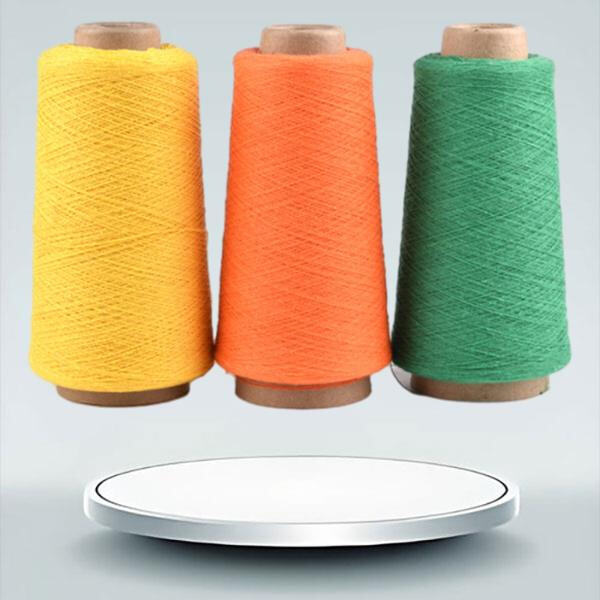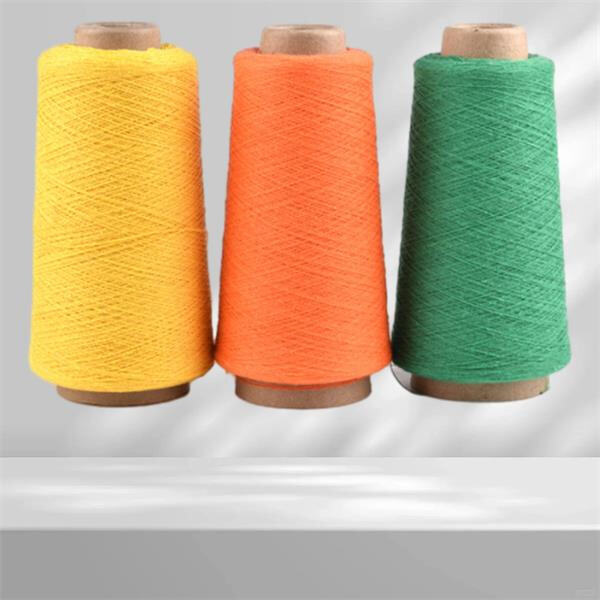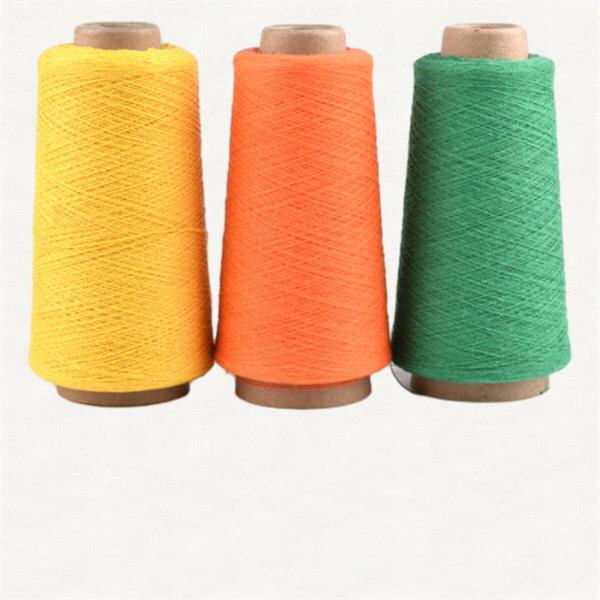Tel:+86 13967879487
Adres e-mail:[email protected]
Tel:+86 13967879487
Adres e-mail:[email protected]
Produkujemy nici, z wełny różnych zwierząt, produkowanych dla estetycznej piękności. Wełna to miękkie, puszyste włosy pozbywane przez zwierzęta takie jak owce, alpaki i kozy. Nasze nici zaczynają się od wełny, którą dokładnie myjemy na początku. To usunie brud, pył i możliwe oleje, które mogą być w wełnie. I trzeba ją dobrze oczyścić, jeśli chcemy, aby nasze nici były miękkie i przyjemne.
Musimy również przeczesać wełnę po jej umyciu. Przeczesywanie przypomina czesanie, gdzie czyszczone są włókna specjalnymi narzędziami i ustawiane są one w tym samym kierunku. To kluczowy krok, ponieważ przygotowuje wełnę do przędzenia. Po przeczесaniu całej wełny możemy łączyć i przędzić włókna. Przędzenie obejmuje skręcanie włókien, aby utworzyć długie, cienkie nitki. To jest zabawny etap procesu, możemy obserwować, jak wełna staje się nicią!
Czasami unosimy naszą włóczkę na wyższy poziom, łącząc różne włókna w naszą mieszankę. Nazywa się to mieszaniem. Na przykład możemy zmieszać wełnę owczą z miększym włóknem, takim jak alpaka. Ta mieszanka #Carmen tworzy włóczkę, która jest ciepła i miękka – idealna do przytulnych projektów! Możemy również mieszać różne kolory wełny. Właśnie tak potrafimy stworzyć unikalną włóczkę o własnym, wyjątkowym wyglądzie, poprzez mieszanie tych kolorów. Wszystkie te mieszanki pozwalają nam tworzyć całe mnóstwo różnych włóczek, każda o innej fakturze i kolorze, które podbędą serca każdego majsterkowicza.
Gdy już przędzimy naszą nić, możemy zdecydować się dodać do niej trochę koloru! Robimy to za pomocą specjalnego procesu barwienia. Zaczynamy od namoczenia nitki w wannie z ciepłą wodą i barwnikiem. Barwnik to pokolorowany płyn, którego uczyliśmy się używać, aby zmienić kolor nitki. Namaczamy, a następnie nagrzewamy nitkę! Kolor ustawia się w włókna, więc pozostaje jaskrawy i piękny. Kończymy płukaniem nitki w czystej wodzie, aby usunąć nadmiarowy barwnik, który nie związał się z nią. To metoda staranna, ponieważ chcemy, aby nasze kolory wyglądały dokładnie tak, jak powinny, i pragniemy, aby nasze włókno było doskonałe do tworzenia!

Gdy nasz nitki zostaną przędzone i barwione do doskonałości, są gotowe do użytku dla tych, którzy chcą je wykorzystać do swetrów czy haftów! Jednakże, zanim możemy je użyć, musimy wykonać małą przygotówkę, aby nadać nitkom odpowiednią grubość i teksturę. Bierzemy nitki i zakręcamy je w duże pętle nazywane kłębami. Te kłębki są krótkie i łatwe w obsłudze oraz przechowywaniu. Następnie ważymy każdy kłebek i sprawdzamy, ile jardów nitki zawiera. To jest szczególnie przydatne dla rzemieślników, ponieważ pozwala im wiedzieć, ile nitki będą potrzebować na swoje projekty. Na końcu, dołączamy etykietę do każdego kłębka zawierającą istotne informacje, takie jak waga nitki i jej skład włókien. Oznacza to, że ludzie mogą kupić dokładnie to, czego potrzebują do swoich prac ręcznych.

Jeśli ktoś użył naszego nici do wytworzenia czegoś niezwykłego, jak np. swetra, szala lub koca, istnieje duża szansa, że będzie chciał to potem zablokować. Blokowanie polega na przepłukaniu przedmiotu, a następnie jego ukształtowaniu, aby upewnić się, że ma odpowiedni rozmiar i formę. Trzeba być tutaj bardzo ostrożnym, ponieważ nie chcemy, aby nasza nitka została uszkodzona. Przedmiot powinien być następnie zupełnie wysuszony, zanim będzie można go nosić lub schować.

Mówiąc o przechowywaniu nitki: jest to bardzo ważne, aby przechowywać ją w bezpiecznych warunkach i w dobrym stanie! Zazwyczaj radzimy ludziom, aby trzymać nitkę z dala od bezpośrednich promieni słońca oraz w chłodnym, suchym miejscu, takim jak szafa lub pudło. Należy unikać bezpośredniego światła słonecznego, ponieważ blada barwa będzie wyglądać brzydko i straci połysk w nitce. A także trzymaj nitkę poza zasięgiem zwierząt domowych. Zwierzęta mogą być ciekawskie i gryźć nitkę, co może ją zrujnować!
Firma dostarcza różnego rodzaju usług związanych z certyfikacją na żądanie klientów. Dodatkowo w naszym zakładzie znajduje się sprzęt do badań przędzy. Każda partia produkcyjna podlega szczegółowym badaniom po jej wyprodukowaniu, a następnie jest eksportowana do innych krajów po zakończeniu testów. Możliwość prowadzenia rozmów w języku portugalskim, hiszpańskim, rosyjskim oraz wielu innych językach — wszystkie są dostępne bez dodatkowych opłat; obsługa posprzedażowa jest gwarantowana w 100%. Skupiamy się na budowaniu długotrwałych partnerstw, a nie jednorazowych transakcji.
Nasz zakład eksportuje miesięcznie około 120 kontenerów do ponad 500 klientów na całym świecie. Dysponujemy wykwalifikowanym zespołem logistycznym, który zapewnia szybką dostawę, profesjonalną obsługę posprzedażową oraz kompleksową obsługę logistyczną. Usługi online są dostępne 24 godziny na dobę. Zapewniamy terminową dostawę zamówienia oraz produkcję przędzy. Każde zamówienie jest traktowane z najwyższą starannością. Serdecznie zapraszamy również na wizytę.
Jeden z największych producentów przetworzonej przędzy w Chinach. Lucky Textile Cangnan Factory Ltd to najbardziej znany w Chinach producent przetworzonej przędzy, którego zakłady obejmują powierzchnię ponad 44 000 m² i dysponują ponad 25 liniami produkcyjnymi wyposażonymi w najnowocześniejsze urządzenia i maszyny pochodzące zarówno z kraju, jak i zagranicy. Naszym głównym celem jest ekologiczna innowacyjność oraz produkcja przędzy.
Główną działalnością firmy jest produkcja przędzy z materiałów wtórnych, takiej jak przędza do skarpet, przędza do hamaków, przędza do rękawiczek oraz inne powiązane rodzaje przędzy tekstylnej. Skład przędzy można dostosować indywidualnie – dostępne są różne opcje produkcji przędzy. Gwarantujemy jakość naszych produktów dzięki ponad 30-letniemu doświadczeniu w zakresie produkcji. Posiadamy klientów na całym świecie. Nasze profesjonalne zespoły techniczne oraz ds. obsługi posprzedażowej zapewniają doskonałą obsługę.